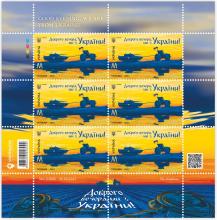Ukrainians responded to Russia’s full-scale invasion not only militarily, but also with an explosion of creativity on the linguistic and cultural fronts, in the form of wartime songs, sayings, art, jokes, and memes. I view this rapid cultural production as a cultural immune response, and consider how it functioned as a defense against the cultural and ideological threats that Russia presented along with its military invasion. I focus on three key threats in Russian propaganda: the denial of Ukraine’s existence, the insistence that Ukrainian and Russian are the same, and depictions of Ukrainians as weak and demoralized. These threats were countered by three themes in Ukrainian social media: the affirmation of Ukrainian existence, the assertion of Ukrainian distinctiveness, and the celebration of courage and resilience in the face of assault. The Russian aggression, instead of disrupting Ukrainian identity, prompted a consolidation and renewed vigor in Ukrainianness. Social media amplified the power of this burgeoning cultural resistance. The digitally circulating memes helped to construct a community that is imagined as bound and yet is pervasive and boundless, including its displaced and diasporic members. An effect of the cultural explosion was the creation of unity across status, class, region, age, gender, and language in Ukraine, and with Ukrainians in diaspora.
Memes as antibodies: Creativity and resilience in the face of Russia’s war.
Bilaniuk, Laada. 2023. Memes as antibodies: Creativity and resilience in the face of Russia’s war. In Dispossession: Anthropological Perspectives on Russia’s War Against Ukraine, ed. by Catherine Wanner. Pp. 143-166. New York: Routledge.
View PDF
(2.86 MB)
